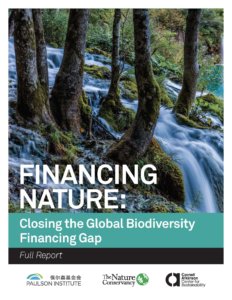Rose Niu presents key aspects of PI’s Financing Nature report during the IUCN World Conservation Congress on September 4, 2021.
While the world is brought to a rude awakening by the pandemic and reexamines the interconnection between nature destruction and human wellbeing, the urgency to step up global biodiversity protection has never been more apparent. Against this backdrop, the IUCN World Conservation Congress opened in Marseille, France and online on September 3, 2021.
The Congress, the world’s largest recurring conservation event, aims to marshal the expertise and influence of its powerful membership to tackle the most pressing conservation issues through its well-represented and widely attended assembly, forum, and exhibition. The decisions from this Congress will help shape worldwide conservation and sustainable development agendas for years to come and inform the policy debates leading into the UN Convention on Biological Diversity Conference of the Parties (CBD COP 15) in China.
 At the invitation of the Post 2020 Biodiversity Framework – EU support, Rose Niu, Chief Conservation Officer at the Paulson Institute, participated in a special session on biodiversity financing under the Pavilion for the Post 2020 Biodiversity Framework via its e-poster platform. Through a prerecorded slide presentation, Rose shared the key insights from Financing Nature: Closing the Global Biodiversity Financing Gap, a report developed by the Institute and its partners in 2020 and widely cited by the international conservation community. To close the global biodiversity funding gap (estimated at US$700 billion/year), it would require a multi-pronged approach, ranging from reducing harmful subsidies and investment risks to supporting new financial innovations to increase capital flows towards biodiversity protection. With this virtual presentation, Rose also reiterated a call to action for key actors to redouble their efforts in generating and channeling resources for biodiversity conservation.
At the invitation of the Post 2020 Biodiversity Framework – EU support, Rose Niu, Chief Conservation Officer at the Paulson Institute, participated in a special session on biodiversity financing under the Pavilion for the Post 2020 Biodiversity Framework via its e-poster platform. Through a prerecorded slide presentation, Rose shared the key insights from Financing Nature: Closing the Global Biodiversity Financing Gap, a report developed by the Institute and its partners in 2020 and widely cited by the international conservation community. To close the global biodiversity funding gap (estimated at US$700 billion/year), it would require a multi-pronged approach, ranging from reducing harmful subsidies and investment risks to supporting new financial innovations to increase capital flows towards biodiversity protection. With this virtual presentation, Rose also reiterated a call to action for key actors to redouble their efforts in generating and channeling resources for biodiversity conservation.
Analysis of the Financing Nature report has helped inform the framing and language of the corresponding themes in the first draft of the Post-2020 Global Biodiversity Framework. The Institute will continue working with partners to advocate for the critical biodiversity financing policies and mechanisms outlined in the report through the upcoming CBD COP 15 conference and other platforms to achieve global biodiversity targets in the coming decade.
Follow @PI_Conservation on Twitter.



